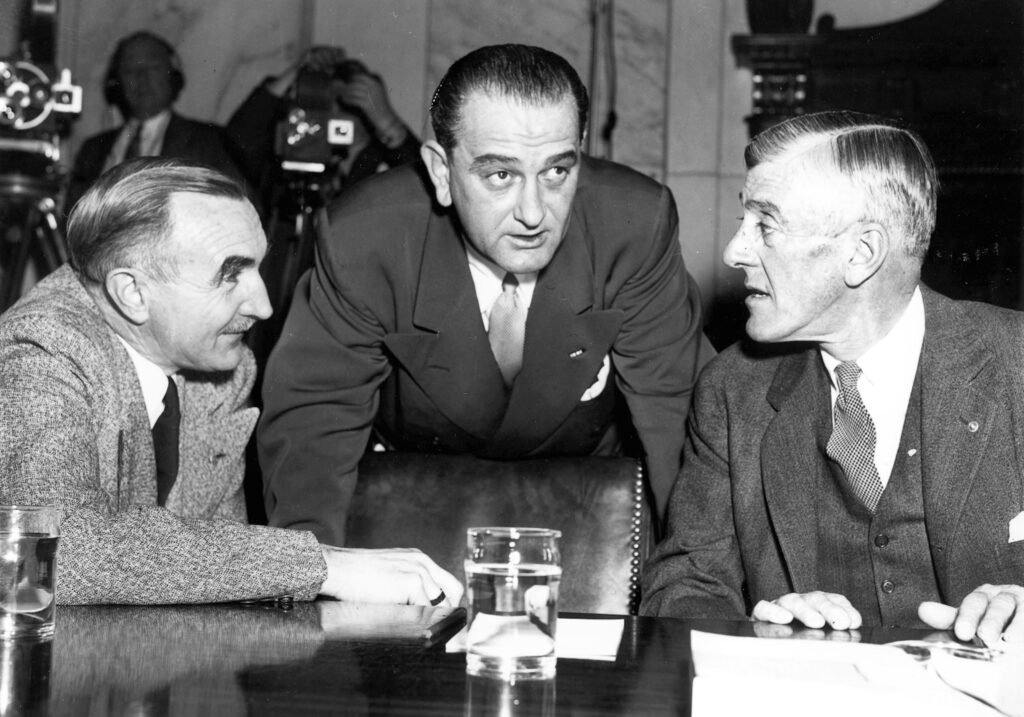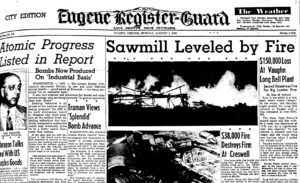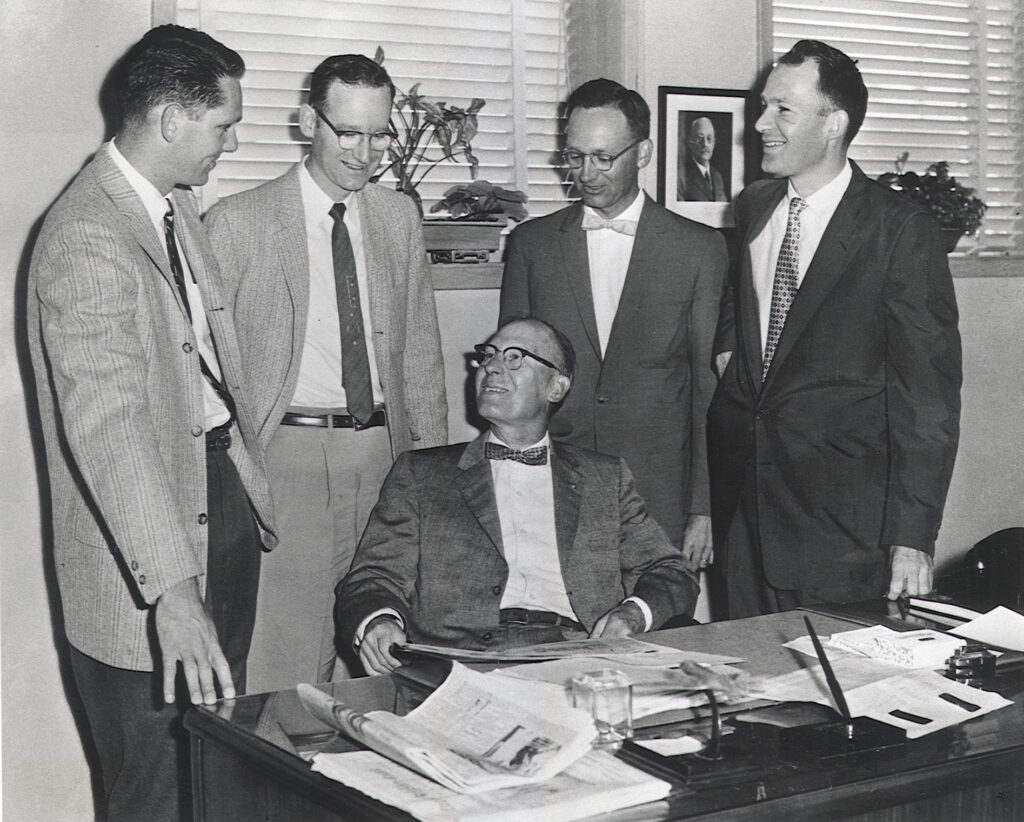Editors take on a dam project and a senator

1947-1957
By Mark Baker
For The Register-Guard
In 1948, after graduating from the University of Oregon with a business degree, Ted Baker, 24, began selling ads for the Register-Guard.
“At the time, the newspaper was a very special media,” Ted Baker recalls. “Radio didn’t seem to mean too much; television hadn’t really been born.”

He started with about 20 accounts, “and from there, I went to answering the phone every time it rang, because I wanted more accounts.” Soon, he had 80.
His biggest sale?
“First pre-print – Sears. With Dad,” Ted Baker says, after thinking for a moment. “That started pre-prints (the glossy ads that are inserted into the newspaper). They wanted to put a section in the paper, so we did it.”
Alton “Bunky” Baker Jr., Ted’s older brother, had worked his way from reporter to city editor to managing editor in late 1950, bumping Bill Tugman up to editor.
Ted Baker became advertising manager in 1951, and younger brother Herbert Baker was now on staff as a reporter, soon becoming city editor and then managing editor after Tugman left the paper in 1954 and Bunky Baker became editor.
The youngest Baker brother, Richard “Dick” Baker, born in Eugene in 1932, would also join the staff in the mid-1950s and eventually become managing editor after “Herb” left in 1958 to attend medical school and successfully pursue a career as a physician.
The brothers’ only sister, Louise Baker Little, never worked at the newspaper, but her son, Fletcher Little, would become general manager in the 1980s.
By the time Alton Baker Sr. had his first heart attack, in 1956, the second generation of Bakers was firmly entrenched in the business.

Tugman’s departure in December 1954 was abrupt and unexpected, according to Warren Price’s book. Robert Frazier, soon to become an associate editor and eventually the paper’s highly regarded editorial page editor, told Price that he speculated it was a combination of factors, from scorn for the modern new building – opened at 975 High St. in September 1952 – to diminished control of the paper.
Tugman bought the weekly Port Umpqua Courier in Reedsport and spent the last seven years of his life there.
The new building was a welcome change from the one the paper had outgrown at 1037-41 Willamette St. Also new was the R. Hoe & Co. press that was capable of printing color and 64 pages (40 more than the Willamette Street press).
A few months before the move, Tugman locked horns with Wayne Morse, the U.S. senator from Eugene whom the paper had endorsed in both 1944 and 1950 when he was still a Republican. But relations had grown increasingly acrimonious with Morse over the years. Morse would leave the Republican party in ’52, first becoming an Independent, then jumping to the Democrats.
A major split with Tugman and the Guard would come in April ’52, after Morse criticized the national press for its coverage of the steel strike crisis that month. President Harry Truman seized the steel mills on April 8 to keep production moving – and thus the building of jet engines, nuclear submarines, etc. – during the Korean War, saying it was a matter of national security.
Morse took Truman’s side, although the Supreme Court would say on June 2 that Truman’s move was unconstitutional, causing the steel workers to walk out.
“We would tell him that this effort to blame … the press is the silliest thing he had ever done, and that’s a large statement … Morse has great abilities, but he would be a more valuable Senator if he would think more and talk less,” Tugman wrote in one editorial.
Morse would accuse the Guard of malice after a couple more stinging editorials, and the paper would allow him a front-page response on June 20, 1952.
“Only personal malice could cause you to read such intentions and motivations into my speech,” Morse wrote, referring to a May 27 speech he’d given to the Electric Consumers Conference, in which he stressed that the United States had yet to scratch the surface of possibilities for a capitalist economy. “You are not more opposed to dishonest and insincere men in politics, be they liberals or conservatives, than I am,” he wrote of Tugman’s inference that he would only have voters vote for liberal candidates regardless of their honesty.
Morse said one of Tugman’s editorials seemed as if “you were writing a script in connection with your Very Little Theatre hobby.”
The paper, which always leaned Republican during Alton Baker Sr.’s days, would not endorse Morse in 1956 or 1962, nor would it endorse him in the May 1960 Oregon primary when he made a late attempt for the Democratic nomination for president, recommending a young senator from Massachusetts named John F. Kennedy.
As editor, one of Bunky Baker’s first crusades came in 1956, as he led the fight to stop the Eugene Water & Electric Board from building a hydroelectric dam on the headwaters of the McKenzie River.
Residents who formed the Save the McKenzie River Association, and many others, believed the Beaver Marsh Project would not only turn Clear Lake into a reservoir but damage Sahalie and Koosah falls and other scenic and recreational assets.
EWEB said it was taxed with providing electricity and water to a growing area, and that in 1955 it had been short 20,500 kilowatts during peak demand and had to purchase power from the Bonneville Power Administration to meet it.
On March 26, 1956, a day before residents voted, the Guard urged a no vote.
“The magnificent falls on the upper river will be magnificent no more if this project is completed,” the editorial said. “The river in its natural state provides enjoyment and satisfaction that is increasingly hard to find in our complex way of life. And the river cannot have these inspirational qualities if it is marred with hydroelectric projects which have rerouted and slowed so many other rivers in the Northwest. It is for these reasons that we recommend a vote against Beaver Marsh.”
Voters rejected the project, 2,238 to 1,846.
Mark Baker, who researched and wrote the stories for this special section, is a former Register-Guard reporter and a member of the third generation of the Baker family.

Mark Baker has been a journalist for the past 25 years. He’s currently the sports editor at The Jackson Hole News & Guide in Jackson, Wyo.
